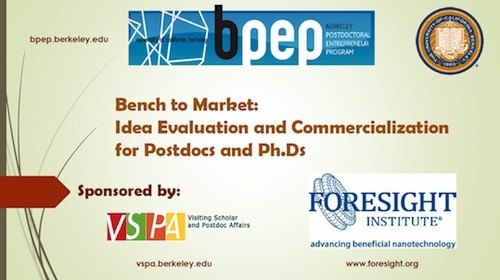

Commercialization of today’s nanoscale science and technology offers not only near-term solutions for many of today’s serious problems, but it can also build infrastructure, markets, and support to further Foresight’s long-term goal of developing advanced nanotechnology based upon productive nanosystems and high-throughput atomically precise manufacturing.
With this interest in promoting a thriving entrepreneurial culture, Foresight was happy to co-sponsor this event from the Berkeley Postdoc Entrepreneur Program’s (BPEP) “Ph.D. to Startup” Workshop Series:
Event details from Eventbrite:
Have you ever considered the commercial value of a product created / inspired from your research findings? What does the industry or the consumer actually need? What do you need to productize your research and solve a problem for the end customer? How can you reach your customers efficiently and get high market penetration? What is a Minimum Viable Product (MVP)? If you are unsure how to answer these questions, this BPEP workshop will help!
The Berkeley Postdoc Entrepreneurship Program is proud to announce another exciting workshop from the “Ph.D. to Startup” series. The workshops are intended to provide the fundamental knowledge needed for graduate students and postdocs considering entrepreneurship as a career option.
The attendees will get to network with the speakers and other aspiring entrepreneurs at the food and beverage session during registration, and also a networking session after the event. Foresight Institute has generously provided sponsorship for our food and beer!
This workshop will be held Thursday June 25th, 2015 in 105 Stanley Hall from 6:00 PM to 8:30 PM. David H. Kirn, MD (CEO & Co-Founder, 4D Molecular Therapeutics), has a deep track record of entrepreneur innovation through multiple companies, is a UC Berkeley Alum, and an excellent speaker. He will kick-off this workshop with a storied presentation of his entrepreneurial experiences moving products from the bench to the market.
An interactive panel discussion will follow with Dr. David Kirn, Dr. Charlie Hotz (Vice President of Development at Nanosys, the Quantum Dot technology leader), and Dr. John Schloendorn (Founder & CEO, Gene and Cell Technologies). The discussion will help the audience understand some of the fundamental questions that you must first ask yourself when moving an idea from the bench to the marketplace.
Rob Meagley, Foresight Senior Fellow—Research (back row, left) and Paul Melnyk, Foresight President (back row, second from left) with other “Bench to Market”attendees.
The workshop began with the presentation by Dr. Kirn “Building a biotherapeutics company: lessons learned from a serial entrepreneur”. Dr. Kirn began by asking “Why do Biotherapeutic Companies matter?” He supported his answer—that they provide the best way to translate research results into clinical benefits for patients— with his experiences developing oncolytic viruses at Onyx Pharmaceuticals and Jennerex Biotherapeutics, and most recently, gene therapeutic products at 4D Molecular Therapeutics, where he is Co-Founder, President & CEO; Co-Chairman.
Most of Dr. Kirn’s presentation focused on how to finance biotherapeutics startup companies. He noted that the average cost to get drugs to patients is $150 million invested over more than 10 years. Taking into account the fact that most biotherapeutic product development efforts fail, the cost averaged over the successful efforts is about $1 billion.
Faced with the cost of raising so much capital, one might consider licensing the technology to a large pharmaceutical company. Dr. Kirn noted, however, that this is a quite risky option since big pharma companies turn over their portfolios every 3 to 5 years, often bringing in new staff and managers, so that your project would have to survive several such turnovers to make it to patients. The advantage of biotech companies is that they combine focus, agility, and speed.
Describing the basic methods to raise capital, he also touched on some of the pitfalls of each: how to value the company, how to keep control of the board, how to delineate the rights of investors vs. the rights of the founders.
From his experiences moving products from the benchtop to the market with three biotherapeutics companies, based on different technologies, founded at different times in different market environments with respect to current scientific fashions and current financial circumstances, and using different mixtures of methods to raise capital, Dr. Krin drew a number of lessons:
Panel discussion with John Schloendorn, Ph.D., Charlie Hotz, Ph.D., and David Kirn, MD.
The networking session after the event
Library of Foresight Institute Conferences on Nanotechnology, 1989–2015
Library of Foresight Vision Weekends and Senior Associates Gatherings, 1992–2008